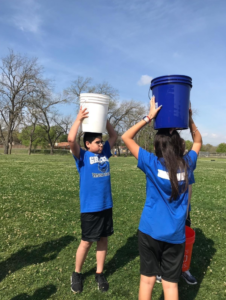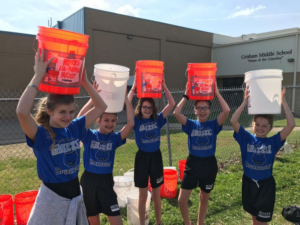Grisham and Hernandez schools host friendly competition for Well Aware
Next week is going to be a bit stinky around Hernandez and Grisham middle schools in the Round Rock Independent School District.
The two schools, which both have the International Baccalaureate advanced curriculum program, have joined forces for a friendly competition: to see which school can raise the most money for Austin-based Well Aware. The nonprofit organization installs wells in Africa and helps communities manage those clean water sources.
One of the ways it raises money for its project is through its Shower Strike. It’s like doing a charity race, but instead of people pledging money for each mile you run, they pledge money for each day they go without a shower during the weeklong Shower Strike.
 This is the 11th year Well Aware has hosted its Shower Strike but the first year these two middle schools have taken it on.
This is the 11th year Well Aware has hosted its Shower Strike but the first year these two middle schools have taken it on.
This year the IB coordinators at both schools had a goal to collaborate and bring the students together, says Dana Browning, the IB coordinator at Grisham. “We thought a challenge would be a good way to bring the students together,” she says.
“We looked for a community partner that we could expose the students to global awareness through action,” Browning says, and Well Aware being both local and working in Africa made it a good choice, she says.
Browning and Emilee Hinegardner, IB coordinator at Hernandez, are hoping that all 650 students at Grisham and the 750 students at Hernandez will participate in the strike. Some students are going without showers. Others are pledging to use less. The Shower Strike begins Monday and lasts through April 29. The teachers are hoping that students will continue to use deodorant and clean clothes.
Each school needs to raise $3,250 for a total of $6,500. That’s the cost of getting a well that stopped working rebuilt in the village of Mbalawala, Tanzania. About 1,400 kids in North Austin and Round Rock will be restoring fresh water for 2,500 people.
“They did have a source of clean water,” Hinegardner says. And now they don’t have access again. “That’s why it’s important to have the well rebuilt,” she says.
The teachers are hoping to take this experience further. They will be sending letters to students in Mbalawala and hoping to create a pen pal club between the Round Rock schools and the Mbalawala school. Browning is hoping to bring the letters to Tanzania this summer.

To really understand the importance of having a working well, both schools had a water walk in which students could see how far they could carry 5 gallons of water, the equivalent of what you need in a day. Each full bucket weights about 40 pounds. The students learned that often kids, especially girls, are walking to get water and carry it back to the family. They learned about how heavy it is, how time-consuming it can be and how that can prevent girls from attending school.
Those local students who couldn’t carry the full 5 gallons also had the option of carrying just the amount they thought they could carry, and they then have the option to just use that amount each day of the shower strike. Students also can participate in the shower strike by using less water or by using a bucket of water to clean themselves instead of a shower.
The students also learned that instead of using 5 gallons of water, we actually use about 17 gallons.
Browning says even after the strike, she hopes the students are more aware of how much water they use and use less.
